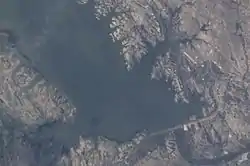Falcon International Reservoir
Falcon International Reservoir (Spanish: Embalse Internacional Falcón), commonly called Falcon Lake, is a reservoir on the Rio Grande 40 miles (64 km) southeast of Laredo, Texas, United States, and Nuevo Laredo, Tamaulipas, Mexico. The huge lake is bounded by Starr and Zapata Counties on the Texas side of the international border and the municipality and city of Nueva Ciudad Guerrero on the Tamaulipas side. The reservoir was formed by the construction of the Falcon Dam to provide water conservation, irrigation, flood control, and hydroelectricity to the area.
| Falcon International Reservoir | |
|---|---|
| Presa Falcón | |
 | |
 Falcon International Reservoir  Falcon International Reservoir | |
| Location | Zapata / Starr Counties, Texas, United States; Nueva Ciudad Guerrero, Tamaulipas, Mexico |
| Coordinates | 26°33′32″N 99°09′53″W at Falcon Dam |
| Type | Hydroelectric reservoir |
| Primary inflows | Rio Grande |
| Primary outflows | Rio Grande |
| Basin countries | United States, Mexico |
| Surface area | 83,654 acres (33,854 ha) |
| Max. depth | 110 ft (34 m) |
| Surface elevation | 301 ft (92 m) |
The dam was dedicated in October 1953 by Mexican President Adolfo Ruiz Cortines and U.S. President Dwight D. Eisenhower. The dam and lake are managed jointly by governments of the United States and Mexico through the International Boundary and Water Commission, which was established in 1889 to maintain the border, allocate river waters between the two nations, and provide for flood control and water sanitation. The lake is named after María Rita de la Garza Falcón, for whom the town of Falcon (displaced by the creation of the reservoir) was named.
Fish and plant life
Falcon International Reservoir has been stocked with species of fish intended to improve the utility of the reservoir for recreational fishing. Fish present in the reservoir include largemouth bass, crappie, catfish, and channel catfish.
The bass population is in decline, a factor which has reduced the number of fishermen and tourists coming to the lake. In 2012, Falcon Lake ranked first for bass in the United States; by 2014, the rank had dropped to number 12. Despite the threat of piracy, security on the lake has been enhanced to the point that State Representative Lyle Larson of San Antonio, a member of the House Committee on Culture, Recreation, and Tourism, declared Falcon Lake, "the safest park on the border."[1]
Alligator gar, large and heavy fish with a long lifespan, feed on the largemouth bass and can survive through droughts. In 2009, restrictions were placed on the harvest of alligator gar, but some area residents maintain that no regulations should be in place and that the gar must be considered as if they were rats and be removed from the lake.[1]
On the shores of Falcon Lake are Texas wild olive (Cordia boissieri), Mexican oregano (Lippia graveolens), hibiscus, mesquite thickets, huisache (Vachellia farnesiana var. farnesiana) and prickly pear cactus (Opuntia spp.). Greater roadrunners, collared peccaries, white-tailed deer, and black-tailed jackrabbits also exist within the park.[2]
Recreation
Falcon State Park is 572.6 acres (2.317 km2) located between Falcon Heights, Texas, and Nueva Ciudad Guerrero, Tamaulipas, and is the southern end of a 98,960-acre (400.5 km2) International Falcon Reservoir. The park's main activities include camping, swimming, fishing, water skiing, and boating, with a self-guided nature trail. Bass fishing is particularly popular on the 98,960-acre (400.5 km2) lake.
Piracy
In May 2010, Los Zetas pirates on the lake claiming to be Mexican Federal Police committed at least three armed robberies. The pirates boarded U.S. boats and demanded either weapons, drugs, or money. Fear of robbery has since dissuaded U.S. fishers from the lake.[3]
In June 2010, U.S. authorities also revealed a plot by Los Zetas to destroy the Falcon Dam.
On September 30, 2010, David Hartley and his wife Tiffany, from McAllen, Texas, were in Mexican waters riding jet skis back from Mexico when they were allegedly chased by two boats containing about six gunmen. The Zapata County Sheriff said the woman escaped and reported that her husband was shot. He is missing and feared dead.[4]
On October 12, 2010, Commander Rolando Flores, the lead Mexican investigator for the David Hartley disappearance case, was beheaded by Mexican drug cartel members and sent in a suitcase to the Mexican military.[5]
See also
References
- Gabriela A. Treviño, "Falcon Lake discussed at hearing: Declining bass population impacts ecosystem, number of tourists" (May 17, 2014) Laredo Morning Times, pp. 1, 10A
- "Falcon Dam". Texas Parks and Wildlife.
- William Booth (May 30, 2010). "Mexican pirates attack Texas fishermen on Falcon Lake, which straddles border". Washington Post. Retrieved 2010-10-13.
- Weber, Paul J. (September 30, 2010). "Sheriff: US man on jet ski shot in Mexican waters". Associated Press. Retrieved 2010-10-13.
- Divina Mims, Eduardo Aragon, Ed Lavandera and Nick Valencia (October 13, 2010). "Mexican investigator in Falcon Lake case beheaded, officials say". CNN. Retrieved 2010-10-13.CS1 maint: multiple names: authors list (link)
External links
- Falcon International Reservoir - Texas Parks & Wildlife
- Falcon State Park - Texas Parks & Wildlife
- Falcon International Reservoir - Handbook of Texas Online
- "Falcon Reservoir". Geographic Names Information System. United States Geological Survey.
- "International Falcon Lake". Geographic Names Information System. United States Geological Survey.